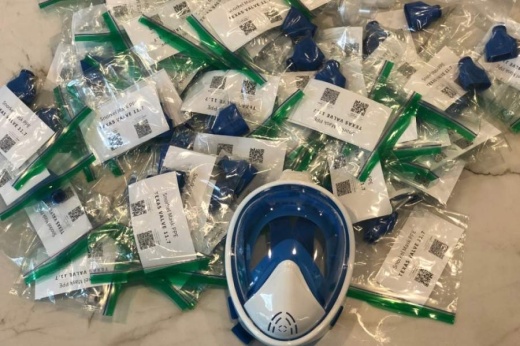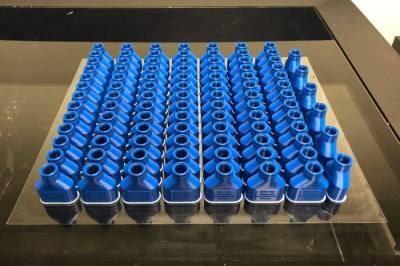“There is a worldwide shortage of masks and other [personal protective equipment], and I did not want to wait until the supply runs out to find an alternative solution,” Dr. Peter Baek wrote in the summary portion of his GoFundMe page.
In hopes of finding a local manufacturer, Baek approached James Griffin, an old friend he worked with in The University of Texas at Dallas’ business incubator. Today, Griffin is the CEO of Richardson-based Invene, a health care software company.
Griffin said he jumped at the opportunity to join Baek in his endeavor.
“I have the distribution channels, I know the people, we have the resources, we have the connection, so I can make a big difference locally,” Griffin said.
Using a 3D printer, Baek and Griffin prototyped various designs of the adapter needed to convert the masks. Eventually, they landed on a product that paired the adapter with a commercially available snorkeling mask and a hospital-grade ventilator filter. The pair enlisted the help of Emerson Automation Solutions in McKinney to 3D print the attachment at cost, Griffin said.
To test the fit of the mask, Griffin said they sprayed a solution in the face of a volunteer to check if any moisture seeped through the seal. Once the pair was confident in the product’s ability to filter contaminants, manufacturing began.
So far, 200 adapters have been made using 3D printers at various businesses and universities, including UT Dallas. The company has also released the computer-aided design of the device online for others to download and use for free.
“What that means is anyone can take our design and modify it on their own,” Griffin said.
The adapter is being distributed for free to health care workers or those close to them, Griffin said. Masks have to be purchased separately.
Baek set up a GoFundMe to help subsidize the adapter’s $10 manufacturing cost. As of April 27, the fundraiser had raised $3,000 of its $5,000 goal.
“This is not a money making initiative,” Griffin said.
Unlike N95 masks, Griffin and Baek’s mask is reusable once the adapter has been disinfected and paired with a new filter; however, the masks are not approved by the Federal Drug Administration and are not meant to be used in place of an FDA-approved product, Griffin said.
“We are a last-resort mask, which means if everything else goes bad, you use us,” Griffin said.





